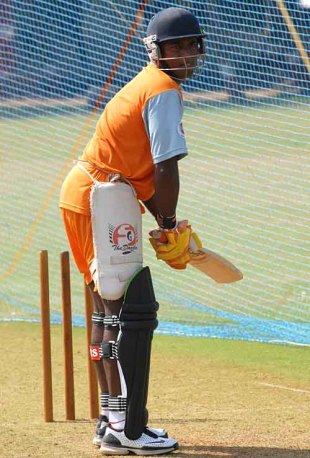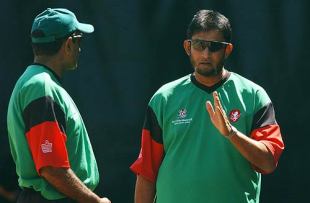Light at the end of the tunnel
For the Indians who've signed up with the ICL, the league is a welcome change from the apathy they've had from the BCCI all these years. By Siddhartha Vaidyanathan
Siddhartha Vaidyanathan
30-Nov-2007
|
|

|
About 15 years ago Kiran Powar was a bigger name in Mumbai cricket than his brother
Ramesh. A left-hand batsman with a wide array of strokes, Kiran struggled to break
into a powerful Mumbai batting order and switched allegiance to other states. He
spent a number of seasons in Assam and Goa, during which time he made many long journeys by bus, and often, considering hotels were too much of a luxury, even spent nights in one. Frequently, with reimbursement hard to come by, he paid his own travel expenses. He even wasn't compensated when he was hospitalised once.
Today Powar enjoys the comfort of the Taj hotel in Chandigarh. He shares the same dressing room as Brian Lara and Nathan Astle. When I speak to him, he's having lunch with Vikram Solanki, Johan van der Wath and Danny Redrup, a South African physio who is "showing me the sort of fitness a cricketer needs". For the first time in Powar's life he has a sense of security. "Tell me one reason why I shouldn't join the ICL" he challenges.
Powar's isn't an isolated case. The general mood among the Indian domestic players
who have joined the ICL is one of disgruntlement. "Until today none of us had an
option," says a player who was picked for India a couple of years ago. "Now we have
someone to take care of us. Wait for some time and players will just rush in."
The BCCI's apathy is a sore point. A domestic veteran talks about a prominent state association. "They made a big din about introducing central contracts for players," he says. "Finally, we said, we've got some security. And they give us an annual contract of Rs 25,000 [US$ 500 approximately]. Is that any sort of money for a year?"
Even more frustrating has been the handling of injuries. Shalabh Srivatsava, an Under-19 star who went on to do well consistently for Uttar Pradesh, travelled to South Africa for an expensive surgery. He is still waiting to be reimbursed. Rakesh Patel, the Baroda fast bowler who was selected for the Indian one-day side recently, underwent a similar fate. "The biggest problem is we can't play when we're injured," says Powar. "It means no reimbursement and no match fees. How do you survive?"
Redrup chips in: "This is exactly how rugby used to be conducted in South Africa
during the amateur days. But things changed with professionalism."
The situation with the coaching staff who have signed up with the ICL isn't too different. Erapalli Prasanna, the former India offspinner, who was with the BCCI's ill-fated spin wing had had enough of being ignored. "By sending me to Nagpur and to Kolkata for short periods, the NCA [National Cricket Academy] sent a clear message that I was not required. The other signal I got was that the BCCI wanted to get rid of me. The spin wing is finished."
Sandeep Patil, who is currently coaching the Mumbai Champs, echoes those views. ""I waited for the BCCI to give me a suitable job to serve Indian cricket. Twice I had written to the BCCI president, Sharad Pawar, expressing my interest to be a coach of the India A
side. I was assured a two-year contract, but after waiting for almost one and a half
years, nothing came of it."
Hurdles, hurdles, hurdles
It's not been easy for these players and coaches who have signed with the ICL. They are derisively referred to as "money whores".
It's not been easy for these players and coaches who have signed with the ICL. They are derisively referred to as "money whores".
Reetinder Singh Sodhi, the former India allrounder, speaks about being refused
entry into a ground in Patiala. "Imagine the scene," he says. "You've gone to a
ground to practise almost every day of your life. And one day they stop you. As if
I'm a criminal or something. I'm still playing cricket only, no?"
Bengal's players faced a similar situation at the Calcutta Cricket and Football
Club, though the Essel Group, which runs the ICL, had a corporate membership at the club. JP Yadav and Mohnish Mishra, two Madhya Pradesh players, were forced to withdraw from a club tournament in Bhopal for a similar reason.
Three Hyderabad players with jobs in state banks were apparently transferred to
Kolkata recently. They've to now choose between moving to a new city and losing
their jobs.
All ICL players have been banned from playing in corporate tournaments organised by the BCCI. Those who have jobs have had their terms of employment made more stringent. Madhya Pradesh batsman Abbas Ali, who works with Indian Oil, is required to work from 9am to 5pm every day and struggles to find time for practice.
It is the youngsters who are hardest hit. "A young cricketer finds a job by telling his employees that he's a cricketer," says JP Yadav, the former India allrounder. "Now, since he can't play corporate tournaments, how is a company going to give him a job? That's a big worry."
Another implication is that cricketers may have to give up the option of playing league
cricket in England - since that requires a minimum qualification of four first-class
games in a season.
|
|

|
Positives galore
Despite the ostracism the players remain upbeat. When JP Yadav walked into the Tau Devi Lal Stadium in Panchkula, his first reaction was simple: "It's fine, yaar. You're talking to someone who's played cricket all his life at the Karnail Singh Stadium." That, incidentally, is the headquarters of the Indian Railways side, a first-class ground that's universally regarded as India's worst in terms of facilities.
Despite the ostracism the players remain upbeat. When JP Yadav walked into the Tau Devi Lal Stadium in Panchkula, his first reaction was simple: "It's fine, yaar. You're talking to someone who's played cricket all his life at the Karnail Singh Stadium." That, incidentally, is the headquarters of the Indian Railways side, a first-class ground that's universally regarded as India's worst in terms of facilities.
The players have been given 12 pairs each of coloured uniforms. They've been exposed to physios and trainers streets ahead of the ones they've been used to in Indian first-class cricket. They've received 25% of the yearly payment promised them (as the base price), and are happy to see sums being deposited every month in Axis Bank accounts that have been opened for them.
Some foreign players have been impressed with the local talent and have spoken about
recommending them to counties and provinces. "Abhishek Jhunjunwala has been
noticed," says a senior player with the Bengal Tigers. "He was even asked if he would want to qualify to play for England."
The ICL, for all the talk of being the poor cousin to the Indian board's Indian Premier League, is still an option that a number of Indian domestic players are seriously considering. As recently as September, a couple of players on the fringes were apparently seriously contemplating joining. Both made their India debuts subsequently and shelved the plan.
A number of other players, though, are still in the loop. "I've got a call from so many domestic cricketers asking, 'What's happening, are they recruiting?" says Yadav. "People are definitely interested. It's just a matter of taking the leap." Like several others, he is convinced that the next 15 days will only reinforce their faith.
Siddhartha Vaidyanathan is an assistant editor at Cricinfo